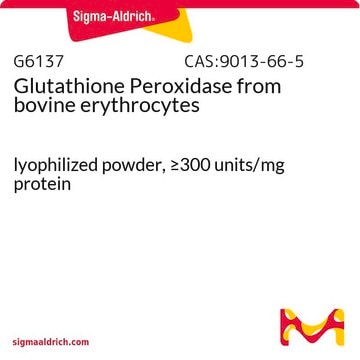GRSA
Glutathione Reductase Assay Kit
Sufficient for 100 colorimetric tests
Synonym(e):
Glutathione Reductase Activity Assay Kit
Anmeldenzur Ansicht organisationsspezifischer und vertraglich vereinbarter Preise
Alle Fotos(2)
About This Item
UNSPSC-Code:
12161503
NACRES:
NA.28
Empfohlene Produkte
Verwandte Kategorien
Allgemeine Beschreibung
Glutathione reductase (GR) is a ubiquitous enzyme that catalyzes the reduction of oxidized glutathione (GSSG) to glutathione (GSH). Glutathione reductase is essential for the glutathione redox cycle that maintains adequate levels of reduced cellular GSH, which serves as an antioxidant reacting with free radicals and organic peroxides. Glutathione is also a substrate for the glutathione peroxidases and glutathione S-transferases in the detoxification of organic peroxides and the metabolism of xenobiotics.
Anwendung
Glutathione Reductase Assay Kit has been used to measure the activity of glutathione reductase as a part of oxidative stress assessment and also to study the effects of antifouling biocides on it.
Biochem./physiol. Wirkung
Glutathione reductase (EC 1.6.4.2) (GR) is a ubiquitous enzyme that catalyzes the reduction of oxidized glutathione (GSSG) to glutathione (GSH). Glutathione reductase is essential for the glutathione redox cycle that maintains adequate levels of reduced cellular GSH, which serves as an antioxidant reacting with free radicals and organic peroxides. Glutathione is also a substrate for the glutathione peroxidases and glutathione S-transferases in the detoxification of organic peroxides and the metabolism of xenobiotics. This kit contains reagents for the spectrophotometric determination of glutathione reductase activity either by following the decrease in absorbance caused by the oxidation of NADPH at 340 nm (UV assay) or the increase in absorption caused by the reduction of dithiobis(2-nitrobenzoic acid) (DTNB) at 412 nm (colorimetric assay). This kit provides reagents for a spectrophotometric assay for measuring the activity of glutathione reductase either by following the decrease in A340 caused by the oxidation of NADPH or the increase in A412 caused by the reduction of dithiobis(2-nitrobenzoic acid).
This kit provides reagents for a spectrophotometric assay for measuring the activity of glutathione reductase either by following the decrease in A340 caused by the oxidation of NADPH or the increase in A412 caused by the reduction of dithiobis(2-nitrobenzoic acid).
Eignung
Suitable for the measurement of glutathione reductase activity in biological samples
Prinzip
This kit contains reagents for the spectrophotometric determination of glutathione reductase activity either by following the decrease in absorbance caused by the oxidation of NADPH at 340 nm (UV assay) or the increase in absorption caused by the reduction of dithiobis(2-nitrobenzoic acid) (DTNB) at 412 nm (colorimetric assay). This kit provides reagents for a spectrophotometric assay for measuring the activity of glutathione reductase either by following the decrease in A340 caused by the oxidation of NADPH or the increase in A412 caused by the reduction of dithiobis(2-nitrobenzoic acid).
Hinweis zur Analyse
UV assay: One unit will cause the oxidation of 1.0 μmole of NADPH at 25 °C at pH 7.5.
Colorimetric assay: One unit will cause the reduction of 1.0 μmole of DTNB to TNB at 25 °C at pH 7.5.
Colorimetric assay: One unit will cause the reduction of 1.0 μmole of DTNB to TNB at 25 °C at pH 7.5.
Ähnliches Produkt
Lagerklassenschlüssel
10 - Combustible liquids
Flammpunkt (°F)
Not applicable
Flammpunkt (°C)
Not applicable
Analysenzertifikate (COA)
Suchen Sie nach Analysenzertifikate (COA), indem Sie die Lot-/Chargennummer des Produkts eingeben. Lot- und Chargennummern sind auf dem Produktetikett hinter den Wörtern ‘Lot’ oder ‘Batch’ (Lot oder Charge) zu finden.
Besitzen Sie dieses Produkt bereits?
In der Dokumentenbibliothek finden Sie die Dokumentation zu den Produkten, die Sie kürzlich erworben haben.
Kunden haben sich ebenfalls angesehen
A comparative cytotoxicity study of TiO 2 nanoparticles under light and dark conditions at low exposure concentrations
Dalai S, et al.
Toxicology Research, 1(2), 116-130 (2012)
Karl W Engel et al.
Journal of biophotonics, 9(11-12), 1148-1156 (2016-07-09)
Photobiomodulation (PBM) therapy has been noted to promote cell proliferation and growth in many different cell types shown both in vitro and in vivo. Currently, treatment regimens are used in the clinic for a variety of ailments, including wound healing.
Effects of antifouling biocides on molecular and biochemical defense system in the gill of the pacific oyster Crassostrea gigas
Mi Seon P, et al.
PLoS ONE, 11(12), e0168978-e0168978 (2016)
V M Factor et al.
The Journal of biological chemistry, 273(25), 15846-15853 (1998-06-23)
In previous studies we have demonstrated that transforming growth factor (TGF)-alpha/c-myc double transgenic mice exhibit an enhanced rate of cell proliferation, accumulate extensive DNA damage, and develop multiple liver tumors between 4 and 8 months of age. To clarify the
Toxicity effects of an environmental realistic herbicide mixture on the seagrass Zostera noltei
Diepens NJ, et al.
Environmental Pollution (Barking, Essex : 1987), 222, 393-403 (2017)
Unser Team von Wissenschaftlern verfügt über Erfahrung in allen Forschungsbereichen einschließlich Life Science, Materialwissenschaften, chemischer Synthese, Chromatographie, Analytik und vielen mehr..
Setzen Sie sich mit dem technischen Dienst in Verbindung.






